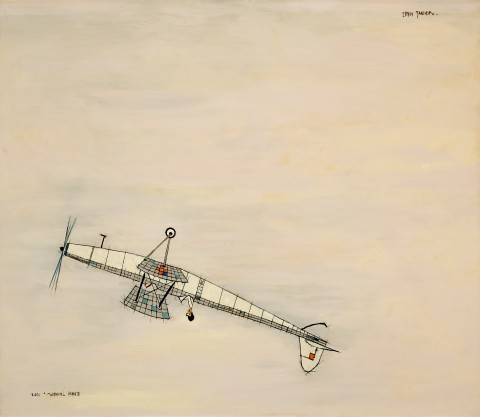SELF PORTRAIT OF THE ARTIST STUNTING, 1958
EDWIN TANNER
oil on composition board
122.0 x 141.5 cm
signed upper right: EDWIN TANNER
signed and dated lower left: EDWIN TANNER. 1958 [inverted]
Shirley Tanner, Melbourne
Mr Frank Galbally, Melbourne, by 1976
Savill Galleries, Sydney
Joseph Brown Gallery, Melbourne
The Cbus Collection of Australian Art, Melbourne, acquired from the above on 9 August 1990 (label attached verso, no. 1990.32)
Edwin Tanner Retrospective 1976, Age Gallery, Melbourne, 18 – 29 October 1976, cat. 34 (as ‘Self Portrait of the Artist Stunting’, dated 54/58)
Five Decades of Australian Painting 1930 to 1980, Savill Galleries, Sydney, 5 May – 5 June 1989, cat. 42 (illus. in exhibition catalogue, as ‘Vice Versa Biplane’, upside down)
Edwin Tanner Works 1952–1980, Monash University Gallery, Melbourne, 15 March – 12 May 1990, cat. 30
Edwin Tanner: Mathematical Expressionist, TarraWarra Museum of Art, Victoria, 12 May – 15 July 2018
on long term loan to Gippsland Art Gallery, Victoria
Art and Australia, Ure Smith, Sydney, vol. 9, no. 3, December 1971, p. 212 (as ‘Self Portrait as a Pilot’, illus. upside down), 222
Duncan, J., Harwood, G., Jamieson, G., and Murray, K., Edwin Tanner Works 1952–1980, Monash University Gallery, Melbourne, 1990, pp. 7 (illus.), 26
Nainby, B., Stanhope, Z., and Furlonger, K., The Cbus Collection of Australian Art, in association with Latrobe Regional Gallery, Melbourne, 2009, pp. 18, 90 (illus.), 232
Fitzpatrick, A., Edwin Tanner: Mathematical Expressionist, TarraWarra Museum of Art, Victoria, 2018, pp. 23, 40 (illus.), 132
Edwin Tanner is among Australia’s most idiosyncratic artists. A polymath, Tanner’s eclectic and diverse career progression and broad range of achievements informed his often-autobiographical paintings. During the Second World War, Tanner held the position of Engineer-in-Charge of Aircraft Design in the Department of Aircraft Production at Fisherman’s Bend in Melbourne. Although he was unsuccessful in three separate attempts to join the RAAF, Tanner eventually learned to fly a Gipsy Moth in 1945 through employment with BHP.1
The many activities of Edwin Tanner provided ample visual source material, mostly industrial, for the artworks he would later exhibit in Contemporary Art Society exhibitions in Melbourne and Sydney. Self Portrait of the Artist Stunting, 1958 is a joyous painting of the liberating rewards the artist enjoyed after years of dedicated and determined study, both as an aeroplane pilot and as a painter. Here the artist’s confidence as a painter is mirrored in its content, presenting himself as an accomplished pilot freewheeling in the void. There is humour in the fact that Tanner signed the painting twice, in opposite orientations, indicating that the image can be read in 360 degrees, following the plane’s own loop-the-loop. Self Portrait of the Artist Stunting is a freeze-frame of a confident, death-defying aeronautical trick, painted with a befittingly spare and unapologetic gesture outlined on a flat and neutral ground.
Tanner existed outside of mainstream currents. His paintings were characterised by a muted palette, a strong black outline, elongated and anonymous figures and scenes with a dry sense of humour, the satirical bite of which occasionally attracted negative public reception. Like the young Melburnian painter, John Brack, Tanner’s distinctive graphic style was formed early and is likely to have been stimulated after seeing the work of French expressionist Bernard Buffet, whose work he saw featured in the travelling exhibition French Painting Today in September 1953.
Although Tanner emigrated to Australia with his family as a small child, the Welshman always remained on the outside of Australian culture, looking in. His artworks reflect this observational distance and impersonal exactitude, their emotive quality hidden instead in plain sight. The muted colour modulations of his minimal backgrounds and the cheeky humour of his stylisation, which reveals a portrait of this artist in his astounding multifaceted complexity.
1. Fitzpatrick, A., Edwin Tanner: mathematical expressionist, TarraWarra Museum of Art, Victoria, 2018, pp. 120 – 122
LUCIE REEVES-SMITH
